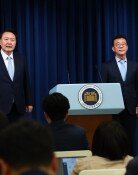Degree Fraud Continues to Plague Nation
Degree Fraud Continues to Plague Nation
Posted February. 14, 2008 20:12,
A professor Hwang from 1999 posted an enticing offer on his personal Web site. The ad said students who enter a two-year program at Hwangs college extension could obtain a degree from a four-year missionary university in the Philippines that had sister relations with the extension.
Twenty-seven people who completed the two-year course on security and secretarial service each paid 5,200 U.S. dollars (4.7 million won). They went to the Southeast Asian country and obtained their promised degree without attending normal classes. The Philippine school was established by a pastor Lee, an acquaintance of Hwang, and was barely surviving due to financial difficulty.
Of the 27 students, 23 were accepted by the universitys officer candidate school. Only two of them, however, became commissioned officers and completed their military service.
Hwang and Lee were arrested in November last year. A prosecutor said, "Professor Hwang designed the scam by using his position as the Armys adviser for gender policy."
In October last year, military courts dishonorably discharged 13 commissioned officials who used counterfeit certificates and tried them.
The Supreme Court announced yesterday that it found out 215 counterfeiters of university degrees and other certificates between August and December last year. Of them, six were arrested and the remaining 209 were indicted without detention.
▽ Finding jobs with fake degrees
Jeong taught Korean language at a private academy for university preparation in Gunsan, North Jeolla Province. He had good speaking skills and won students over after being rumored to have graduated from a university in Seoul with a degree in Korean.
But his graduation certificate was a counterfeit forged at a store in Cheonggye Stream in downtown Seoul for 110,000 won. Jeong was later indicted for forgery of a private document.
Seo got a desirable job with a company thanks to his good score on the TOEIC (Test of English for International Communication). His score sheet, however, was a fake that was printed on a color printer. Seo was subsequently fired from his job and now faces prosecution for fraud.
▽ Fake degree mill
Cho established a university in the United States without official permission and advertised the school in Korea. He offered degrees equivalent to those of regular universities.
Cho received 34.5 million won in entrance fees from 17 students who applied after seeing the ad. He also opened a training course for natural therapists and bilked 52.5 million won from 21 people in tuition fees. The con artist was arrested at the end of last year after one of his victims reported him.
A salary man Yang was caught using a thesis he paid a ghostwriting agent for to receive a masters degree.
▽ Impersonating doctors or lawyers
Kim ran a gynecological clinic in Changwon, South Gyeongsang Province. Seeking a higher income, Kim pretended to be a medical doctor on the clinics Web site from 2006, when Kim only had a specialists license. Kim was indicted without detention for violating medical law.
Prosecutors also indicted 123 persons on the charge of posing as doctors of Oriental medicine, architects or lawyers or performing jobs with forged qualifications.
bell@donga.com






